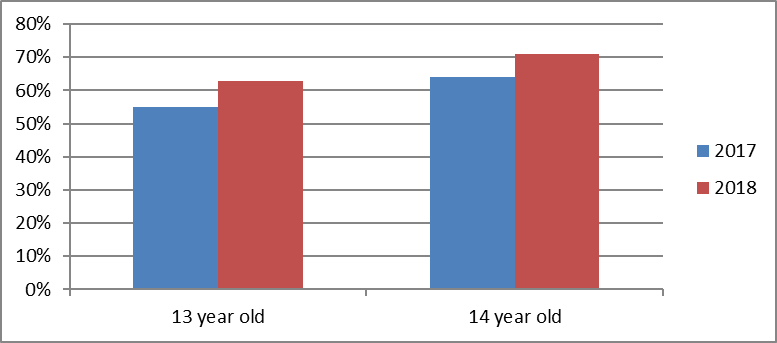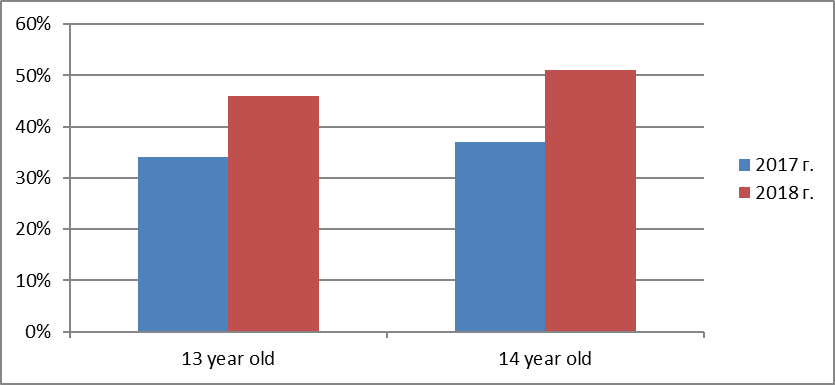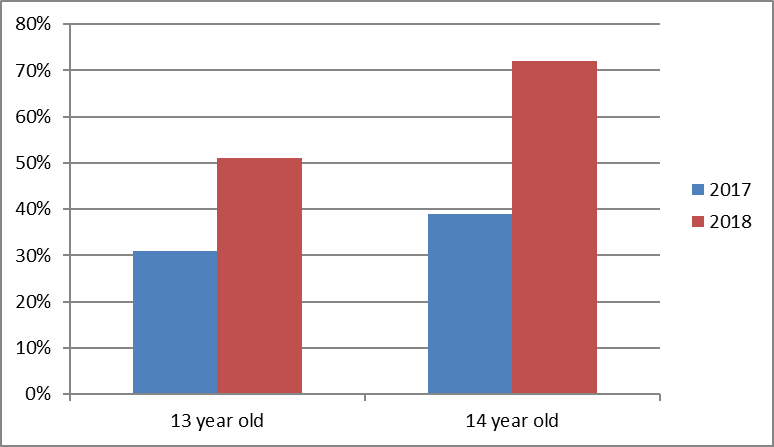Abstract
The approaches to the problem of the relationship between the processes of socialization and individualization in the modern multicultural space are revealed. It is shown that in classical psychology, these areas of development were opposed to each other and were considered antagonistic. In modern psychology, it became possible not only to correlate socialization and identity, but also to analyze the points of interaction between these processes. The significance of the historical-genetic approach for the theoretical study of socialization and identity in a multidimensional and uncertain multicultural society, as well as for the development of empirical studies of the individual form of socialization is revealed. The criteria for socialization in a multicultural space with the multidimensional ethical and behavioral standards are exposed. It is proved that it is the individual form of socialization that is optimal for the formation of a non-frustrating way for children and adolescents to enter a multicultural society. This is due to the fact that this form of socialization takes into account both the social experience of adolescents, their attitude to the standards and norms of society, and the content of their identity. An equally important factor in the flexible combination of socialization and individualization in a multicultural society is the dominance in the structure of social identity of the hobby and family, as well as the differentiation of personal identity, enabling flexible communication with others.
Keywords: Socialisationindividualisationmulticultural societyemotional experience
Introduction
The problem of socialization and individualization in psychology
The problem of the entering of a person into a new social reality was considered for more than half of the twentieth century as a problem of social and psychological adaptation, both in the ontogenetic paradigm (in the case of a child growing up and his gradual entry into the world of adults), and in the case of transition of an adult person to another social and even an ethnic group. At the same time, there was actually no question of the individual forms of such a process, and possible variations were considered on the basis of the features of adaptation to the norms proposed by society, giving (or not giving) a person to realize his interests and inclinations in pro-social activity. The theory of the model personality (Benedict, 1934; Mead, 1988) can be considered as one of the most rigid variants of this approach.
The introduction of multidimensional approaches to the analysis of the structure of the social environment and the expansion of the boundaries of individual activity and selectivity in the process of entering society, allowed us to move from the concept of adaptation to the concept of socialization. This concept interprets socialization as the interaction of a child and an adult, in which society imposes certain norms to a person, but not so rigid as to exclude the possibility of their variable use and some transformation in certain, permitted by society, boundaries. Another important point that enhances the possibility of personal selectivity and activity in the process of socialization is the presence of various social and cultural groups with quite seriously different standards in behavior, communication, values. It gives a person additional opportunity in the process of categorization - that is, in the process of searching the group adequate for his aspirations, interests and individuality. Thus, there are grounds for a comparative analysis of two processes - socialization and individualization.
Recent works in the field of social representations (Moscovici, 1998, 2011), as well as the works of Gergen (2003), proving that a person constructs the surrounding social reality based on his motivation, his intellectual and personal capabilities further expanded the boundaries of personal activity in the process of socialization, showing that this is a truly creative process in which a person creates not only his own subjective image of the world, but, in part, reality itself. Moreover, individuality largely determines the boundaries of this activity and the variability of the socialization process.
The theoretical analysis of this problem showed that within the framework of classical psychology, the processes of socialization and individualization are considered as diametrically opposed in goals, direction and mechanisms of development. Representatives of various classical approaches adhere to this position, despite the substantial methodological differences between them.
In the paradigm of non-classical psychology, were created approaches that imply the interrelation of the processes of socialization and individualization, their harmonic combination. The basis for the revision of traditional views was the separation of concepts of society and culture, the variability and diversity of the mechanisms of personal development (identification, alienation, exteriorization, exteriorization, etc.), as well as expanding the boundaries of personal freedom entitled to non-conformism, to overcome the pressure of others, especially in those cases when his desire for self-realization is frustrated.
In modern science, the concepts of socialization and individualization are filled with new content, and the approach to their interrelation and interaction is also new. The basis for the revision of previous ideas is the postmodernism methodology, which implies the multi paradigm approach to scientific research, the expansion of the concept of “activity”, which is manifested not only in the individual nature of the reaction and the ways of interaction with the outside world, but also in the design of the subjective image of this world.
Thus, modern approaches to the problem of socialization and individualization make it possible to link a person’s aspirations to socialization, rootedness in a certain group, and individualization. Nowadays we can combine person’s intension to preserve individual style of activity and communication, allowing realizing the most complete self-realization. At the same time, the process of socialization is viewed as the ratio of categorizing the different groups and self-categorization (Martsinkovskaya, 2014).
Methodology of socialization and individualization in a multicultural society
Investigation of process of socialization in conditions of multicultural society demands the special methodological approach based on methodological principles and postulates of cultural-historical psychology and a postmodern. The cultural-historical paradigm in the humanities (philosophy, psychology, linguistics) assumes inclusion of socialization in a cultural-historical context and its connection with enculturation and individualization (Martsinkovskaya, 2015b).
Thus, the phenomenon of social transitivity is partially overcoming, as the culture sets much more precise and steady frameworks to socialization process, as well as it gives clear and constant standards and identification’s objects (for example, historical and literary heroes). The important point of a cultural-historical discourse is also the interpretation of language as determinant of socialization (Humboldt, 1985; Potebnya, 1976; Shpet, 2005), thus the analysis of the internal form as a phenomenology of the transformations occurring in culture.
The important advantage of postmodern methodology is its flexibility and orientation to changes. If in classical methodology the picture of scientific knowledge is rigidly set and the change of this "gestalt" arises in unusual cases (in situations of paradigm’s change) the important value of postmodern methodology is the opportunity of critical judgment of categories and principles in varying (ambiguous) social contexts. This fact is represented to be extremely significant at carrying out the researches of socialization process of modern teenagers in situation of the multicultural and uncertain society, setting wide variability of socialization, its orientation and norms.
Flexibility and variability of a postmodern in a combination with different cultural standards, attitudes and identification’s objects give the basis for interface processes of socialization and individualization that is the extremely actual both for a modern science, and for a society as a whole.
Problem Statement
The historical-genetic approach allows not only to correlate theoretical analysis with the development of the empirical part of the study, but also to compare the concepts of socialization - individualization with the modern social situation of adolescent development, their individual characteristics and communication style.
Proceeding from it, cultural-historical and postmodernist principles must be used at the organization of a series of the empirical researches, devoted to studying of phenomenology and mechanisms of socialization and identity’s formation in sensitive periods of personal development. Today in a situation of multicultural world these phenomenology and mechanisms make alternative to their traditional laws.
That’s why so important to investigate the problem of variability/stability of various parameters of socialization’s process. It gives the opportunity to clear a question of activity and freedom of personal choice in conditions of modern normative space and to analyze variability of individual trajectories of socialization in interrelation with individual characteristic of personal identity.
Research Questions
One of the central questions is the analysis of the possibilities and limits of the conjugation of the concepts of socialization and individualization, which in many psychological schools are viewed as diametrically opposed and competitive.
No less important is the question of the criteria for successful socialization, not frustrating the personal growth. It will help to objectify the psychological component of the process of the admission of children and adolescents into the social world.
Purpose of the Study
The aim of the work was the study of the concept of “individual form of socialization”, which helps the positive socialization of adolescents and young people and gives opportunities for their personal growth and maintaining a holistic identity.
Research Methods
The questionnaire “Level of socialisation” (Martsinkovskaya, 2015a);
The test “My social emotions” (Martsinkovskaya, 2015a).
The questionnaire “Personal identity” (Martsinkovskaya, 2017).
The questionnaire “Structure of social identity” (Martsinkovskaya, 2015a);
Participants
The survey involved 260 respondents, 13 year old (N=130) and 14 year old (N=130) pupils of Moscow comprehensive schools. The study was conducted in 2017-2018 year. All the participants gave their consent to participate in the study.
Findings
The data, obtained in the process of diagnostic of the level of socialization showed, that all pupils had rather high level of socialization (more than 50%) (fig. 1).

We can state that from 13 to 14 years the group of well socialized adolescents is expanding. This indicates that while growing up children adopt the group norms more actively and as well find an adequate place in different groups. It is generally has a positive effect on the process of socialization. At the same time, the number of children actively rejecting group norms is sharply reduced by the age of 14.
The data obtained in the study of identity showed that during the year – between 13-14 years - the degree of differentiation of identity increases, with no significant discrepancies between the degree of differentiation of the identity of 13 and 14-year-old adolescents (fig. 2).

Correlation analysis showed that there is a relationship between the degree of socialization of teen-ages and the differentiation of self-image (rxy = 0.46). Adolescents with a high level of socialization and have more differentiated self-image. Children, who experience difficulties in the process of socialization, usually know the norms, rules and values set by adults, but do not accept them. Our materials show that they have a low degree of differentiation of self-image. Perhaps this is due to the fact that the low degree of differentiation of self-image leads to poor, inadequate knowledge of their qualities, their positive and negative traits, which complicates the process of socialization within the boundaries, set by adults.
There was also conducted the study of the level of development of social emotion experiences. The results are presented in figure
It turned out that over the course of a year, at both 13-year-old and 14-year-old adolescents we can see the increase in the level of social experiences, and at the age of 14 this jump is more pronounced than that of 13-year-olds.

A comparison between the level of development of social experiences of teen-ages and the degree of their socialization was made. It turned out that there is a relationship between the level of development of social experiences and the level of socialization of adolescents (rxy = 0.846).
Analyzing the relationship between these three parameters – identity, emotional experience (social emotions) and socialization- it can be assumed that the leading element here is the degree of differentiation of personal identity, which facilitates the internalization of the social standards set by others.
This data also shows the role of emotional experiences in expansion/narrowing of borders of identity. Thus, it has been revealed, that positive social emotions (the attitude to norms, rules, standards, significant for a social environment) move apart frameworks of social space and variety of roles to teenagers. Positive social emotions also stimulate occurrence of positive individual emotions (the attitude to myself) and a level of personal identity’s differentiation. Negative social emotions though don’t have the same value, play not a smaller role in narrowing personal identity. Apparently, it is connected with replacement of negative personal representations to unconscious and reduction of differentiation, quantities of parameters on which people estimate themselves.
The relationship between the structure of social identity and social experiences was revealed. It is shown that in Moscow adolescents who live mainly in the multicultural environment of a megacity, the developed social experience is closely related to the parameters of family and personal identity and this correlation is quite significant (rxy= 0.64 and rxy= 0.41). Such relationship provides Moscow teenagers to obtain a high level of socialization in a multicultural space.
Conclusion
Both theoretical and empirical data show, that it is incorrect and unproductive to divide processes of socialization and identity’s formation. We must state their interrelation, defining as the maintenance of self -image and motive’s hierarchies as well as the ways of realization of these motives in frameworks set by society and culture. Such approach connecting socially-psychological and individually-psychological approach to socialization is represented to be the most productive.
Positive social experience and a focus on family and personal hobbies are the important indicators of the success socialization in a multicultural society, since they make it possible to avoid ethnocentrism. An equally important factor is the differentiation of personal identity, enabling flexible communication with others.
The leading factor expanding the boundaries of the productive interaction of these two processes is the concept “individual form of socialization”, which allows the formation of an active human position in the direction given by society.
The data obtained in an experimental study made it possible to identify some criteria for successful socialization in a multicultural space that does not frustrate a personal growth. They are positive social experiences, high sociometrist status in the group, and differentiated personal and social identity. These results are important both in practical terms (as they allow identifying people who have violations in the processes of socialization and / or individualization) and in terms of theory, as they provide an opportunity to objectify the psychological component of the process of children's admission into the social world.
Experimental study of the content of the individual form of socialization and the conditions for its formation, made it possible to reveal its connection with social experiences and the identity of adolescents.
The importance of the data obtained is primarily due to two factors. First factor is the variability of modern society, which is constantly changing the rules and norms, even for stable social groups. Thus, people constantly find themselves in a situation of uncertainty about the norms and values most preferred by broad social group at the moment. Proceeding from this, it can be stated that the process of socialization as such takes place not only in the first 10-15 years of life, but throughout the course of life.
The second, no less important fact is that the successful self-realization of any person requires social acceptance, it is a measure of success and the possibility of dissemination, recognition by others the results of human creative activity. Especially important such adoption of various etalons in situation of multiculturalism, representing (obliging) to the awareness of the variability of elections and the multidimensionality of ethical standards. Such socialization success requires the development of personal style of activity and professional orientation, as well as personal style of communication with others, which helps to gain a support of the group that positively assesses the values realized by the subject. At the same time, activity and productivity cannot differ significantly from the standards proposed by society. Thus, both personal and professional development and self-realization are impossible without individual forms of socialization, which, on the one hand, make it possible to realize activity on the prosocial channel, and on the other, remove external and internal barriers of this activity as much as possible.
Acknowledgments
The study was supported by Russian Foundation for Basic Research, project 17-06-00077-OGN\18.
References
- Benedict, R. (1934). Patterns of Culture. Boston-New York: Houghton, Mifflin and Company,
- Gergen, C.J. (2003). Social constructionism: knowledge and practice. Minsk: BGU
- Humboldt, W. von (1985). Language and philosophy of culture. Moscow: Progress.
- Martsinkovskaya, T.D. (2014). Methodology of modern psychology: a change of paradigms?! Psychological studies, 7(36), 1. Retrieved from http://psystudy.ru /index.php/num/2014v7n36/1012-martsinkovskaya36.html
- Martsinkovskaya, T.D. (Eds.). (2015a). Identity and socialization in the modern world. Moscow: MPGU Press.
- Martsinkovskaya, T.D. (2015b). The problem of socialization in the historical-genetic paradigm. Moscow: Sense.
- Martsinkovskaya, T.D. (Ed.) (2017). Identity in everyday and transitive world. Moscow: MPGU Press.
- Mead, M. (1988). Culture and the world of childhood. Moscow: Science.
- Moscovici, S. (1998). Machine, creating gods. Moscow: Centre for Psychology and Psychotherapy.
- Moscovici, S. (2011). Century of Crowds. Moscow: Academic project.
- Potebnya, A.A. (1976). Aesthetics and poetics. Moscow: Art.
- Shpet, G.G. (2005). Philosophical and psychological works. Moscow: Science.
Copyright information

This work is licensed under a Creative Commons Attribution-NonCommercial-NoDerivatives 4.0 International License.
About this article
Publication Date
14 July 2019
Article Doi
eBook ISBN
978-1-80296-063-1
Publisher
Future Academy
Volume
64
Print ISBN (optional)
-
Edition Number
1st Edition
Pages
1-829
Subjects
Psychology, educational psychology, counseling psychology
Cite this article as:
Martsinkovskaya*, T., Kiseleva, E., Markovskaya, O., & Turusheva, Y. (2019). Connections Between Socialization And Individualization In Multicultural World. In T. Martsinkovskaya, & V. R. Orestova (Eds.), Psychology of Subculture: Phenomenology and Contemporary Tendencies of Development, vol 64. European Proceedings of Social and Behavioural Sciences (pp. 365-372). Future Academy. https://doi.org/10.15405/epsbs.2019.07.47
